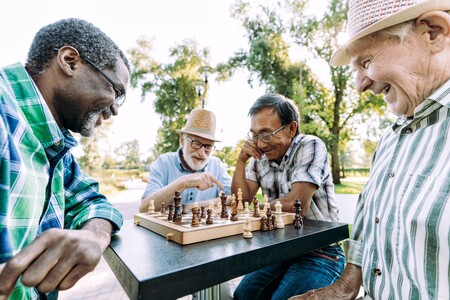Group Games for Older Adults
Think games are just for kids? Think again. Research shows group games for older adults are essential to healthy aging, increasing happiness and life satisfaction, while reducing loneliness and distress. That’s why games and recreation are a big part of life at The New Jewish Home, at both our skilled nursing care and housing locations, as well as in our adult day programs in Manhattan and the Bronx.
Read on to learn how older adults can get in the game—and why they should.
Why Group Games Matter in Older Adult Rehabilitation
Group games are vital to older adult rehabilitation because they simultaneously provide physical, cognitive, social, and emotional benefits. By making therapeutic exercises engaging and fun, games help to motivate older adults to participate in their treatment, which improves recovery and enhances overall well-being.
Types of Group Games for Older Adults
Cognitive & Social Games
Cognitive and social games such as puzzles, brain teasers, and memory games help stimulate mental abilities and preserve brain sharpness. These games are typically played while seated, are highly adaptable to differing abilities, and are often familiar to older adults, which can make the experience easier, accessible, and more fun.
Some “brain games” that are popular at The New Jewish Home include:
- BINGO: A delightful social experience coupled with memory challenges, BINGO exercises hearing, sight, and touch through listening for numbers, scanning cards, and marking them with pieces.
- Checkers: This straightforward board game emphasizes logic and basic hand-eye coordination.
- Chess: A more intricate gameplay experience, chess enhances problem-solving skills and reasoning, and stimulates increased brain activity and concentration.
Read more about the benefits of these games for older adults and where to play them for free (or at low cost) in and around New York.
Physical Games
Physical games—such as balloon volleyball and beanbag toss—are repetitive physical therapy “in disguise” used to enhance balance, motor skills, and hand-eye coordination. Other adapted physical games, including chair yoga and resistance-based exergames (video games that combine game play with physical activity), can help older adults improve their strength and flexibility in a fun, low-impact way.
Group fitness classes for older adults are another option for those who want to remain active and healthy. Catering to different capabilities, these classes can significantly improve physical well-being, enhance mood, and reduce the risk of chronic conditions like heart disease and diabetes.
One group physical activity that’s a favorite among many at The New Jewish Home doesn’t require any special exercise equipment: it’s pet therapy. Proven to offer tremendous physical benefits (along with emotional and cognitive ones), pet therapy can help lower blood pressure, alleviate chronic pain, and encourage movement. Activities like brushing a dog or playing with a cat can improve motor skills, while walking a furry friend provides much-needed exercise to those healthy enough to do so.
Creative and Artistic Group Activities
No group spends more time on creative and artistic activities than those over age 65, according to a national arts study—and with good reason: crafting and art therapy can significantly improve an older adult’s physical and emotional well-being, strengthening both cognitive and fine motor skills.
At The New Jewish Home, we understand how crafting, music and art therapy can help older adults thrive. Our programming features an array of services that empower, engage, and entertain: from live musical performances and gardening activities that include seasonal planting, flower arranging, and fresh air therapy, to “Hand in Hand,” our resident-led group of creatives who make handmade items like scarves, hats, and paintings to sell for a good cause.
Adapting Games for Different Abilities
When it comes to games for older adults, it’s important to recognize that individuals have varying abilities and interests—and those may change over time. Our activities coordinators always:
- Consider sensory needs, using games with larger print, clear sounds, or adaptations to accommodate visual or hearing impairments.
- Accommodate mobility issues with seated versions of games or select those with minimal physical exertion for those with limited mobility.
- Encourage social interaction by choosing activities that promote conversation, teamwork, and laughter.
- Keep it fun and engaging, offering a mix of games to cater to different interests and abilities within a group, and/or prizes to add a little bit of excitement.
Focusing on each individual’s needs, interests, and abilities is central to our hospitality program, which aims to make everyone we care for feel valued, respected, and at home.
Experience the Joy of Group Games at The New Jewish Home
As we age, an active, engaging—and fun!—lifestyle is crucial to our overall well-being.
Learn more about the recreational programming at The New Jewish Home designed to encourage older adults to socialize, exercise their mind and body, and boost their spirits. Contact us today.

